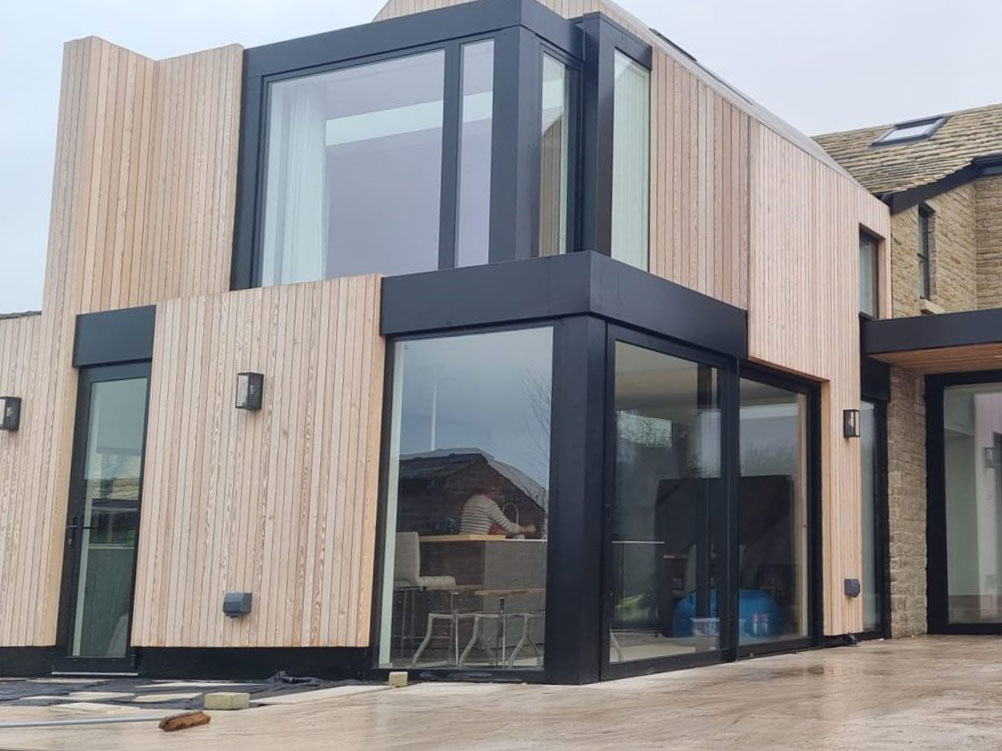
Aluminium has been a game-changer in the construction industry since the 1930s, when it was used to construct several components of New York’s Empire State Building. Considered the go-to choice for architects, approximately 24% of finished aluminium products are used within the building and construction sector globally. But, why is this the case? Is aluminium better than other commonly used materials, such as wood and plastic? We’ll be diving deep into the pros of architectural aluminium VS wood and plastic to see which material comes out on top.
Architectural Aluminium is an umbrella term for technical rainwater products and roofline systems or facades for buildings. This can include, but is not limited to, the following:
The benefits of architectural aluminium VS wood and plastic is present in the construction sector for many reasons. While wood may be a popular choice for cladding, there are certain things you have to look out for, such as the species of wood and whether it will need treatment or not. Similarly, while plastic cladding is commonly used for kitchen and bathroom remodelling, its lack of sustainability plays a significant role in its disadvantages when compared to aluminium.
But, what about aluminium makes it the better choice?
With winter almost upon us and temperatures continuing to drop, weather conditions can become more severe. Torrential rain, thunderstorms and heavy downpours can cause plastic rainwater systems and drainage channels to overflow, and wooden systems to rot or become damaged.
Whereas, our architectural aluminium rainwater products have approximately three times the capacity of conventional plastic alternatives – able to withstand the external elements without causing leaks, damage or rot. Additionally, given their 30+ year life expectancy, our aluminium rainwater drainage solutions are virtually maintenance-free products.
When it comes to aluminium, the material provides an unwavering certainty that at the end of its useful life, it will then be recycled again to begin another useful life. This is because aluminium is 100% recyclable, infinitely. Meaning all of its components can be recycled again and again, without losing any of its beneficial properties.
On the other hand, plastic lies at the heart of many environmental concerns, and only certain types of plastic can be recycled, depending on their resin code. The same can be said for wood, as whether it can be recycled or not depends on its classification and grade. Wood is typically a single-use material that is either sent to landfill or incinerated at the end of its life.
Leaving room for plenty of freedom when it comes to the design of your architectural rainwater products and facades, aluminium can be powder-coated in any colour of your choice. Contrastingly, customised wood and plastic require regular re-painting.
Providing a wealth of creative liberty for your domestic, commercial and industrial projects, aluminium is a prime example of malleability. The material can practically be configured into any shape without breaking, cracking or weakening. This feature is what allows our Seamless Aluminium Gutters to have no joints in the running length, preventing leaks and damage to your rainwater system.
In comparison, wood is generally more brittle and can break or splinter when subjected to force, rather than easily bending into shape like aluminium.
Back in 1982, Jerry Willock started InterCounty Rainwater, after being one of the first people to recognise the potential of seamless aluminium gutters in the North West region. 42 years later, we are proud to still be operating from our base in Hyde, Greater Manchester, where it all began.
Consistently answering to a strong demand for low-maintenance property solutions, you won’t find a wider range of aluminium rainwater drainage products anywhere else! We offer a comprehensive selection of Seamless Aluminium Gutters, Sectional Aluminium Gutters, Aluminium Downpipes, Aluminium Hopper Heads and Architectural Aluminium.
Not only is the aluminium we use for our seamless gutters BBA Approved, but it is also double-coated, extending the life of the gutter and keeping away rot, rust, cracks and blistering on the paintwork.
Thanks to InterCounty being manufacturers, suppliers and installers, we are there for you from start to finish, ensuring an efficient, straightforward and cohesive project. Need us to match our products to your bespoke measurements? No problem! Our seamless aluminium gutters are manufactured on-site using a specialist mobile rolling machine in order to fit your exact requirements, so there is no wastage to consider.
If you’d like to find out more about our Architectural Aluminium products, or any of our other aluminium rainwater drainage offerings, get in touch with us to discuss your project requirements today. Our friendly and knowledgeable team are always happy to help, simply give us a call on 0161 768 5282 or email us at sales@intercountyseamless.co.uk. Or, if you prefer, visit our website to fill in the contact form with your details and we will get back to you as soon as possible.
If you have any questions about our products, please visit our FAQs page for more information. Can’t find an answer to your question? Please don’t hesitate to get in touch.
If you prefer you can use the form below to leave us your details and we’ll get back to you.